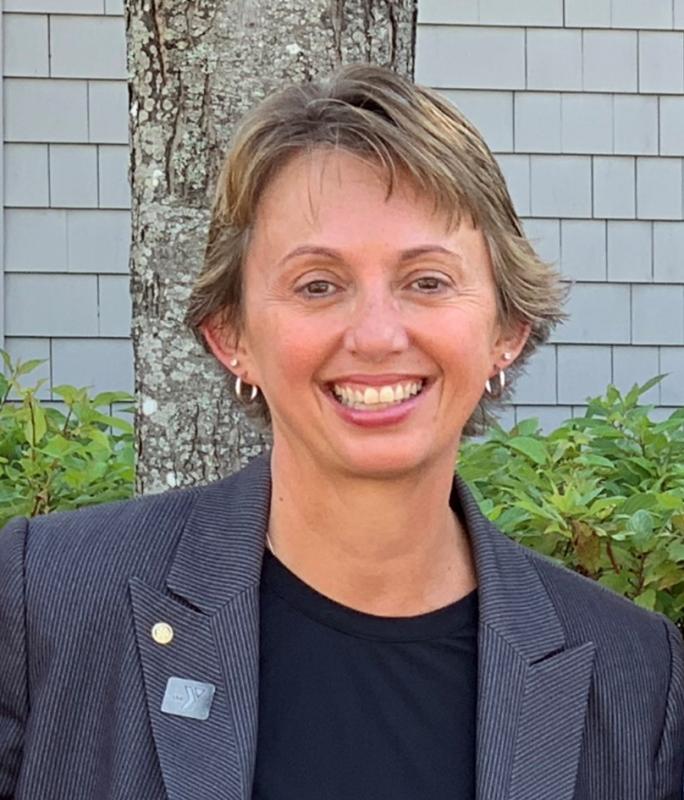Bellew to Camden Rotary: Childcare essential for workforce development
Penobscot Bay CEO Melissa Bellew characterized safe, affordable childcare as an essential component of workforce development during a recent Camden Rotary Club meeting.
Bellew’s talk highlighting childcare gaps and potential solutions was the ninth in a series on local economic and workforce development challenges. The monthly series covers topics such as demographics, vocational training, attainable housing, and workforce skills gaps. It is designed to generate collaboration among leaders in the public, private, and nonprofit sectors to improve the region’s economic vitality.
Bellew addressed the widening needs for childcare across Maine, including the Midcoast, as crucial for working families. This childcare includes preschools for infants children up to school age, before- and after-care at school sites, and summer programs for school-age children.
“Without safe, affordable childcare, our socioeconomic machine will collapse,” Bellew said. “Care for children year-round is an absolute infrastructure need for our communities. We have to address it as such. If we don’t, we’re going to be in this continuous cycle of challenge and problem after problem with no solution. We must figure out what we can do at the community, state, and federal level to improve childcare.”
Bellew noted that the COVID-19 pandemic has raised awareness about local and statewide childcare deficits, which became more evident as many childcare centers closed due to health concerns.
“People, institutions, legislators, and government entities are taking notice,” she said. “Two-thirds of childcare providers in Maine lacked enough resources in 2020 to cover lost revenue and increased operating costs. Many of them have closed and not reopened. Waiting lists for childcare are blowing up, and we don’t have enough spaces to meet families’ needs. We traditionally average about 30 childcare sites in Knox County, and at least a third of those provide in-home care.” Even at full capacity, without a pandemic forcing closures, “those spaces do not even cover the need. Now, waiting lists are skyrocketing because the need has increased while providers have decreased. At our Y, waiting lists expanded by 50 percent.”
The lack of childcare spaces is one part of the problem. Affordability is another. Some 43,000 children in Maine currently live in households spending more than 30 percent of their income on housing. The average cost of daycare is $200 per week. Even with government subsidies and the scholarships that some childcare centers can provide, the cost of childcare is too burdensome for many families. In some cases, it can prevent parents from taking jobs in an economy that desperately needs workers.
Another challenge in providing adequate childcare is staff retention. Bellew pointed out that in Maine, the median wage of the early educator workforce is approximately $11 to $12 an hour—about $23,000 a year for professionals with two-year associate degrees or four-year bachelor’s degrees in early childhood education.
“How are we going to retain and recruit staff at that level?” Bellew asked. “One thing we’ve done here at our Y is that we’ve lifted our minimum for childcare up to $15 as an investment in the staff as educators. They have one of our community’s most critical jobs in caring for children. Despite what we know about the importance of positive and enriching experiences in young children’s lives, early educators earn the lowest wages in the education field.”
Balancing the need for fair wages with required staffing ratios, tuition fees, and budgetary limits will be crucial. “Improved compensation and other professional supports for the workforce will improve our early care and education system. We need to increase our state’s commitment to update and strengthen early care and education. If we invest in our early educators, they can focus on their work, building our children and creating that future workforce and children who are well adjusted and happy.”
Bellew said that YMCAs throughout Maine advocate in the legislature for measures to increase childcare services: “We partner with other statewide entities like the Maine Association for Early Learning and the Children’s Cabinet to agree on consistent policies regarding childcare, and we hope to get legislation that will benefit our staff and our funding streams. We always say this: ‘Ensure that all young children have an equal opportunity for healthy growth and development is a long-term investment in Maine’s future prosperity.’ Ninety percent of a child’s brain develops as early as five years old. Positive early learning experiences establish strong foundations for the brain’s architecture. We know that we have to take care of our children, and we know that having that equal opportunity is a long-term investment.”
Locally, said Bellew, “We look at the needs of families and recognize that some parents need to drop kids off early and pick them up late. That’s why the Penobscot Bay YMCA provides early-morning and late-afternoon care at elementary schools in Rockland, Thomaston, Lincolnville, and Camden-Rockport.” The COVID pandemic shut these services down, but by running programs like these in normal times, YMCAs here and elsewhere are modeling ways to bring childcare up to date with the needs of today’s families.
Bellew called on members of the public to advocate with state legislators for childcare staff and childcare site investment: “Childcare is a critical component of our state’s infrastructure and workforce development.”
A recording of Bellew’s talk is available from the club’s library of recorded presentations at https://www.camdenrotary.org. Recordings and handouts from previous talks and announcements of future speakers can also be found on the website.
The club welcomes visitors at its weekly meetings, which take place Tuesdays at noon on Zoom. Anyone who would like to attend can obtain connection details from Stephanie Griffin: steph.griffinsg00@gmail.com
Event Date
Address
United States


























